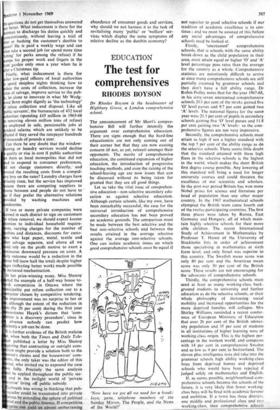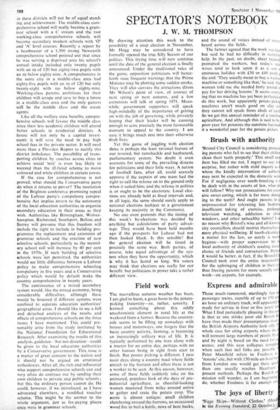EDUCATION
The test for comprehensives
RHODES BOYSON
Dr Rhodes Boyson is the headmaster of Highbuty Grove, a London comprehensive school.
The announcement of Mr Short's compre- hensive Bill will further intensify the argument over comprehensive education. There are signs enough that the hard-line educationists are not only coming out of their corner but that they are now causing concern (if not, as yet, retreat) amongst their opponents. The merits of comprehensive education, the continued expansion of higher education, the introduction of progressive teaching methods, and even the raising of the school-leaving age are now issues that can be discussed without its being taken for granted that they are all good things.
Let us take the vital issue of comprehen- sive education—non-selective secondary edu- cation as against selective education. Although certain schools, like my own, have been remarkably successful, the case for the universal introduction of comprehensive secondary education has not been proved on academic grounds. The comparison must be made between the best selective and the best non-selective schools and between the results attained in the average selective against the average non-selective schools. One can isolate academic issues on which good comprehensive schools must be equal if not superior to good selective schools if our tradition of academic excellence is to con- tinue; and we must be assured of this before any social advantages of comprehensive schools need be looked at.
Firstly, 'uncreamed' comprehensive schools, that is schools with the same ability break-down as the child population in their area, must attain equal or higher '0' and 'A' level percentage pass rates than the average for the country as a whole. Comprehensive statistics are notoriously difficult to arrive at since many comprehensive schools are still partially creamed by grammar schools and they don't have a full ability range. Dr Robin Pedley notes that for the year 1967-68, in his sixty-seven uncreamed comprehensive schools 20.1 per cent of the intake gained five '0' level passes and 9.7 per cent gained two 'A' levels. The national figures for the same year were 21.3 per cent of pupils in secondary schools gaining five '0' level passes and 11.g per cent gaining two 'A' levels : so the com- prehensive figures are not very impressive.
Secondly, the comprehensive schools must attain as high if not a higher standard with the top 5 per cent of the ability range as do the selective schools. There seems little doubt that the standard attained with these high fliers in the selective schools is the highest in the world, which makes the short British first degree course possible. Any lowering of this standard will bring a need for longer university courses and could threaten the excellence of our scientists and scholars. In the post-war period Britain has won more Nobel prizes for science and literature per head of population than any other major country. In the 1967 mathematical schools olympiad the British team came fourth out of the twelve participating countries. The first three places were taken by Russia, East Germany and Hungary, all of which main- tain highly selective schools for their more able children. The recent International Study of Achievement in Mathematics by Professor T. Husen of the University of Stockholm lists in order of achievement those specialising in mathematics at sixth form level, and only Israel was superior to this country. The Swedish mean score was only 80 per cent and the American mean score was only 30 per cent of the British score. These results are not encouraging for the advocates of comprehensive schools.
Thirdly, the comprehensive schools must send at least as many working-class back- ground students to university and further education as do the selective schools, or their whole philosophy of increasing social mobility and increased opportunities for the more deprived families will collapse. Mrs Shirley Williams reminded a recent confer- ence of European Ministers of Education that over 26 per cent of the British univer- sity population and 35 per cent of students in all institutions of higher learning were of working-class origin. This is the highest per- centage in the western world, and compares with 14 per cent in comprehensive Sweden and as low as 4 per cent in Switzerland. The eleven plus intelligence tests did takeinto the grammar schools high ability working-class boys from deprived homes and deprived schools who would have been rejected if judged solely on mathematics and English.
If, as seems possible, neighbourhood com- prehensive schools become the schools of the future, it is very likely that fewer working- class boys will be fired with academic fervour and ambition. If a town has three districts, one middle and professional class and two working-class, then comprehensive schools in these districts will not be of equal stand- ing and achievement. The middle-class com- prehensive school will really become a gram- mar school with a C stream and the two working-class comprehensive schools will become secondary modern schools with '0' and 'A' level courses. Recently a report by a headmaster of a 1,300 strong Newcastle comprehensive school pointed out that since he was serving a deprived area his school's annual intake included only twenty pupils with an IQ of 120 but eighty-two pupils with an IQ below eighty-nine. A comprehensive in the same city in a middle-class area had eighty-five pupils with an IQ of 120 but only twenty-eight with us below eighty-nine. Working-class parents ambitious for their children will scrape and save to buy a house in a middle-class area and the only gainers will be the middle class and the estate agents.
Like all the welfare state benefits, compre- hensive schools will favour the middle class since their less academic children will attend better schools in residential districts. A house will not only be a capital invest- ment; it will save the need to pay high school fees in the private sector. It will need more than a Plowden Report to rectify this district imbalance. The possibility of trans- porting children by coaches across cities to achieve social 'mix' is even less likely to succeed than the ill-fated scheme to move coloured and white children in certain towns.
If the case for comprehensives is not proved, what should the Conservative party do when it returns to power? The resolution of the Brighton conference promising repeal of the Labour party's compulsory compre- hensive Act implies return to the autonomy of the local .education authorities to organise secondary education in their areas as they wish. Authorities like Birmingham, Wolver- hampton, Richmond, Southport, Bolton and Surrey will presume that this freedom will include the right to include in building pro- grammes the replacement and extension of grammar schools and the erection of new selective schools, particularly as the second- ary school roll will increase by 40 per cent in the 1970s..If such building of selective schools were not permitted, the authorities would see little difference between a Labour policy to make comprehensive schooling compulsory in five years and a Conservative policy which would by default make the country comprehensive in twenty years.
The continuance of a mixed secondary system would, like the mixed economy, bring considerable difficulties, although these would be lessened if different systems were confined to separate education authorities' geographical areas. I should like to see a full and detached analysis of the results and effects of comprehensive schools on the three issues I have mentioned. This could pre- sumably arise from the study instituted by the National Foundation for Educational Research. After examining the results of this analysis, guidance—but not direction—could be given to the local education authorities by a Conservative government. This issue is a matter of great concern to the nation and it should not be argued on emotional orthodoxies. After all, the rich and influential who support comprehensive schools can and very often do contract out by sending their own children to private and public schools ; but this the ordinary person cannot do. He could, however, if we introduced, as I have advocated elsewhere, a modified voucher scheme. This might be the answer to the whole argument, just as fee-paying places once were in grammar schools.















































 Previous page
Previous page